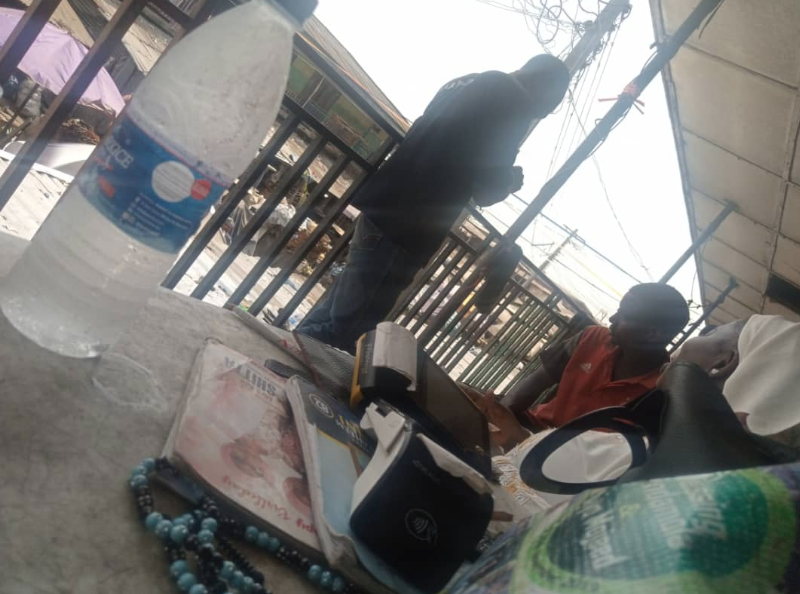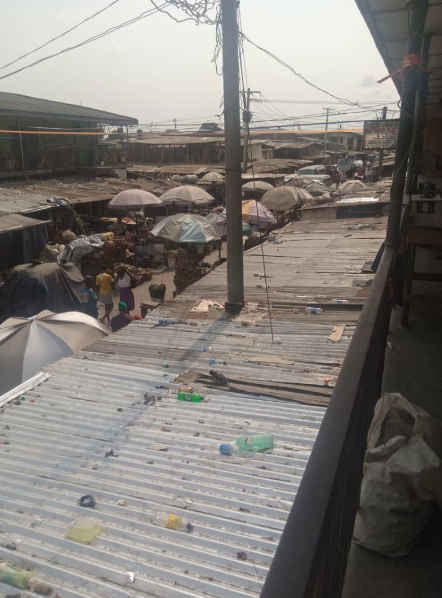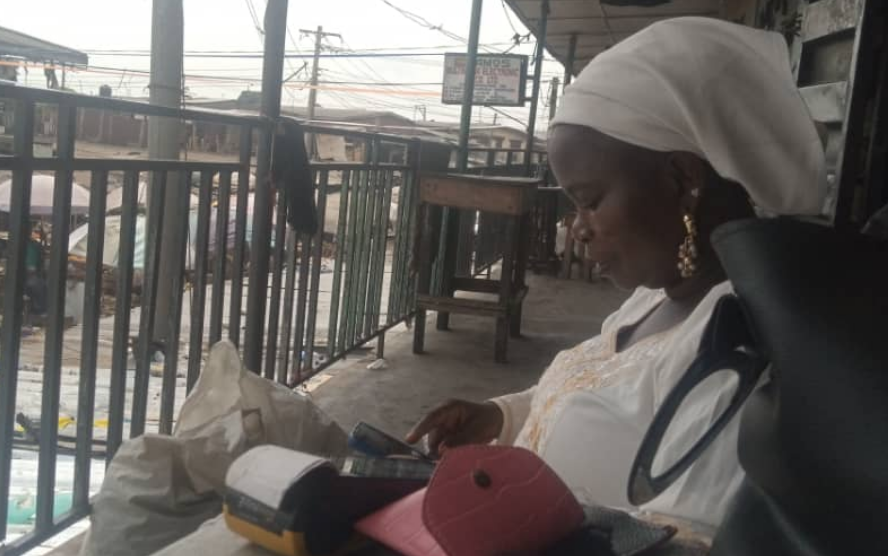Since the federal government announced the redesign of the N200, N500, and N1000 notes, point of sale (PoS) operators and other Nigerians have been struggling to lay their hands on the new notes.
Spending a day with a PoS operator in Lagos shows there is more to the challenges caused by the cash crunch that surfaced due to the new policy introduced by the Central Bank of Nigeria (CBN) — the scrambles, desperation, long queues, and lamentations.
In 2012, PoS terminals began springing up across the country following the introduction of the cashless policy by the CBN. The policy brought banking closer to the people in the shape of small kiosks, old shipping containers, and fastened-down umbrellas crouching on roadsides nationwide. With just a swipe of ATM cards on the PoS machines, Nigerians began to withdraw money, make transfers and make deposits without visiting their banks.
The COVID-19 pandemic and its stringent crowd restriction aided the popularity of PoS terminals further, with banks limited to a number of visitors per day, Nigeria embraced the alternative.
Advertisement
MEET THE POS ALHAJA

The warm early morning sun was almost morphing into its harsher mid-day self when Alimot Shadia Idowu, affectionately dubbed Alhaja, opened her PoS stall for the day. It was 11:04 am, yet the vibrance of Mushin market, where her stall was located, had only started bubbling — like a pot of water on low heat.
It was a Thursday, and most traders were trickling in after adhering to the compulsory weekly sanitary curfew imposed by the Lagos state government. The law prohibits traders from opening their shops before 10 am every Thursday. They are supposed to engage in environmental sanitation around their business environments during the time, but most traders find other uses for those hours.
Advertisement
Alhaja spends hers at a local mosque, alongside a dozen other women, doing extra prayers popularly tagged “Assalatu”. Thereafter, she would clean the plastic table where her two PoS machines would sit and commence work for the day.
The widowed mother of four only agreed to TheCable’s visitation after days of persuasion. Her initial decline stemmed from rumours that the police were arresting PoS merchants for inflating charges. She said the business is one way her family’s needs are met and must be protected.
Alhaja is a popular PoS merchant in the market even without a display of signboards and her stall’s location on the top floor of a two-storey shopping mall. She was not even set for the commencement of business when her customers started pouring in, with rainbows of plastic ATM cards.
‘I RELY ON OTHER TRADERS TO STAY IN BUSINESS’
Advertisement

It was midday, and the initially quiet environment had given way to the noise of grinding machines, chatters of buyers and sellers, and megaphones peddling everything from toothbrushes to erectile dysfunction herbs. Amid the ear-splitting chaos, Alhaja leaned forward and explained how she beat the naira scarcity to stay in business.
There have been unconfirmed reports that some PoS merchants collude with bank officials, buy wads of cash for hoarding, then inflate withdrawal charges.
Before the currency redesign policy began, a withdrawal of N1,000 to N5,000 attracted a N100 fee, while N10,000 to 20,000 had N150 to N200 charges.
TheCable had reported that charges have risen as high as N1,400 for N10,000 in some parts of Lagos since the scrambling for cash began.
Advertisement
“There are three places that I don’t like visiting in this life: the hospital, police stations, and banks. I do not visit banks. I do not go to the bank to buy money for hoarding. Never. I do not even know about that at all,” Alhaja said.
“I rely on other traders in this market to remain in business. Since the naira scarcity began, I pleaded with them to bring me the cash proceedings from daily sales. Once they bring it, I transfer the money into their various bank accounts, while I use the cash for my business.”
Advertisement
While explaining how she gets cash despite the scarcity, a fishmonger, whose shop squats beside Alhaja’s, walked in with wads of mixed naira notes. Alhaja said her gratitude to the woman before flipping through the notes to ascertain the figure the fishmonger had quoted.
Alhaja deposited N170k to the woman’s bank account and sent her a receipt of the transaction on WhatsApp.
Advertisement
“Before the scarcity, I would charge them N500 on every N20,000 I help deposit to their account, but now I cannot charge,” she continued.
“They are helping me. They are God-sent. Several PoS operators have gone out of business because of this situation.”
Advertisement
A girl arrived with a blue flask. She opened it and brought out N30k cash. Alhaja collected it and said: “That’s from Iya Ramo; she sells pepper down there.”
‘I STILL CHARGE THE SAME AMOUNT AS BEFORE’

Alhaja said she decided to keep her withdrawal charges at the same rate they were before the naira scarcity began: N100 per N5000.
But she added that there is a limitation to the number of people offered the service. Only buyers, who are customers of the traders that deposit money with her, are afforded such service. Others are discharged with inflated charges.
“If I see faces I do not know, I just increase the charges to chase them away. For now, I only do withdrawal services for customers of the traders around me. Sense is needed in everything we are doing. I serve only those that serve me,” she said.
DEALING WITH TRANSACTION GLITCHES
Two customers strolled into Alhaja’s stall. A woman and man, both dripping with sweat after hours of transversing the market for cash.
They tucked one of their ATM cards into Alhaja’s PoS machine and punched in the PIN. But instead of a message confirming the success of their transaction, the red alert of a failed process popped up. Another try on their other two cards produced the same result.
“This is what we have been facing since,” the man said. “All the ATM cards with us have been misbehaving.”
Alhaja tried the three ATM cards one more time, and the problems persisted. The customers left in frustration.
The scrambling caused by the naira redesign has resulted in huge traffic for online transactions. This has led to more pressure on the digital platforms of the banks. Crashes and network failures have become common.
Alhaja said, in most cases, she stands her ground and explains to the customers that these glitches are not her fault.
PAYING TOUTS TO SECURE HER BUSINESS
She was still lamenting about the hurdles of the business when two men with bloodshot eyes walked in. The men reeked of marijuana. They hailed her, as usual. She flashed them a crescent of a smile in response. Alhaja knew the game. She handed the men N2,000 from her bag. They bounced off in appreciation.
“That is how we survive here. You cannot be dealing with all these amounts of cash and not settle thugs,” Alhaja said.
“You see all of them,” she continued, pointing her mouth in the direction of an assembly of topless men loafing in front of a crumbling bungalow far away. “They are useful. Even the bad child has his own useful moment. They are the reason I’ve not been robbed in this market.”
It was past 6 pm, and the sun had shrunk to a dull orange hub in the west. The market had begun to thin out. Alhaja too had almost emptied her bag of cash. Over 50 transactions completed, the earlier rush has grounded to trickles.
Alhaja stood up and waddled to the stalls of traders surrounding her, kneeling and thanking them. They are her benefactors; those who help her stay afloat in these trying times. Alhaja resumes tomorrow with her struggles renewed.
Add a comment





